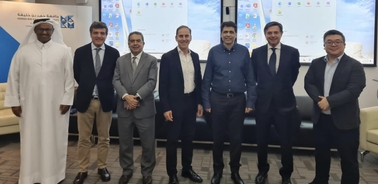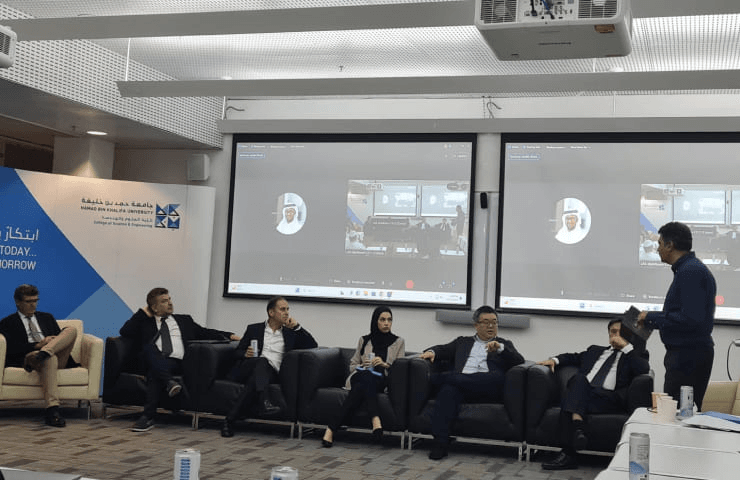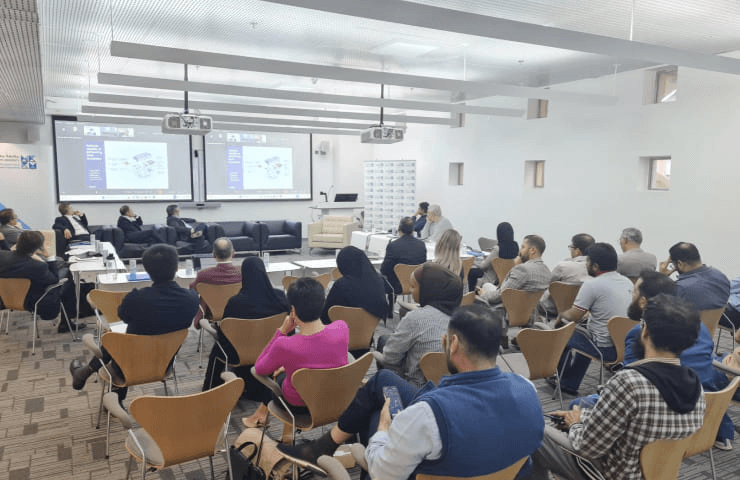IE Impact Xcelerator and Hamad bin Khalifa University collaborate at the Healthcare and Technology Collider

The global roundtable discussed potential research and investment opportunities in healthcare.
The IE Impact Xcelerator and Hamad bin Khalifa University (HBKU) hosted the Healthcare and Technology Collider event, which produced a wealth of formidable starting points for research to improve healthcare with AI and new technologies.
Top-tier participation from Dr. Mounir Hamdi, Founding Dean of the College of Science and Engineering, HBKU and Dr. Ikhlaq Sidhu, Dean, IE School of Science and Technology, along with HBKU Board Members and an extensive online and presential participation enriched the forum that mixed experts from different intellectual and professional backgrounds in the healthcare and tech industry in order to achieve ideas that no single silo would have achieved independently.
Dr. Aiman Erbad, Associate Professor and Head of Information and Computing Technology Division, and Sidhu welcomed attendees to the event and led the global roundtable discussion, which was held at HBKU in Doha, Qatar. The panel sought to engage with different technologies-- such as artificial intelligence, sensors, telemedicine, behavioral analytics, metaverse/digital twins, genomics, and medical devices among many other technologies-- to improve the healthcare services in Qatar and globally.
The eight panelists included top-notch industry experts like Dr. Mitchell Stotland of Sidra Hospital in Doha, Dr. Niko Mihic, Medical Doctor for Real Madrid Football Club and Dr. Pepe Zamorano of Hospital Ramón y Cajal in Madrid with researchers like Amine Bermak, HBKU and entrepreneur and founder David Yeregui Marcos, IE University.
The conversation focused on several research and investment opportunities in the sector involving data, health sensors, improving clinical drug trials, medical simulations and digital twins, as well as AI’s incorporation to diagnosis and medical schools’ curricula.
HBKU Professor and Associate Dean Bermak explained how data can improve healthcare in three ways.
“The first one will be personalization, because everyone reacts differently. Number two is prediction, and three is optimization,” Bermak said.
Zamorano, Head of Cardiology Service at Hospital Ramón y Cajal elaborated on the point and expressed the need for structured data.
“We need structured data. I think what we’re doing wrong is that we approach hospitals’ research in a vertical way. We need to move it to a horizontal approach, a holistic approach to the problem,” Zamorano said.
Mitchel Stotland, Vice Chair for the Department of Surgery at Sidra Hospital explained how a global platform is needed to document data in a structured and standardized way where doctors can work in their own silos.
The discussion shifted to the use of medical sensors and their promising capabilities, calling for more investments into them.
Bermak emphasized the need to develop wearables that can be embedded onto skin or clothes for improved data collection.
“I really think that wearables have to evolve from, like watches and maybe smart rings to embedding wearables into our clothing and let’s say printed sensors that you can print on any substrate,” Bermak explained. “You need to read the signal, you need to transmit it wirelessly. You cannot do that with wearables and therefore this is a huge challenge that needs to be solved.”
Sidhu asked the panel what could be done to speed up clinical drug approval processes, make them less expensive, and increase the likelihood of their success.
Marwa K. Qaraque, Associate Professor at HBKU highlighted how AI could reduce the need to have large testing groups in drug trials.
“The use of AI is going to really help. When you go to the personalized medicine and things like that, it can predict what will work for which group, and so you don’t really need such a large testing group,” Qaraque said.
Bermak spoke about the use of organs on chips to potentially avoid animal testing of drugs.
“There’s lots of research going on now worldwide where people are trying organs on a chip, and by doing that, actually sometimes they can even avoid animal tests. So they can do the test real time on platforms that are basically chips. They are organs on chips because they have biological cells on them,” he explained.
The panel then discussed how digital twins and medical simulations help the sector.
Stoteland talked about virtual surgical planning to prepare for operations.
“Virtual surgical running. So we can cut a bone, we can turn it into a new shape virtually, we can pre-plate our titanium plates. This is all done pre-surgically. So, in the operating room we have IGS (image-guided surgery) that fits on the bone,” Stoteland explained.
Zamorano described the use of holographic reconstruction for practicing heart surgeries, allowing surgeons to stimulate operations before the actual intervention.
The panel were asked about their general observations and comments on healthcare and its advancements.
David Yeregui Marcos, member of the Executive Committee and Entrepreneur in Residence at IE Sci-Tech discussed the advancement of preventive and wellbeing healthcare, especially with AI.
“One of the overarching ideas that we have is that healthcare spending is moving from care and treatment, which was the traditional approach, to wellbeing and prevention. This paradigm shift is where AI plays a huge role as we mentioned between data and early detection with AI and deep learning algorithms,” Marcos highlighted.
Shaun Holt, COO of Alveo Technologies elaborated on AI’s value in diagnosis and spotting potential threats.
“AI is going to be super valuable in terms of just interpretation and diagnosis, or even catching problems before the problems,” Holt added to the discussion.
Dae-Jin Lee, Professor at IE University commented on the need for more biological engineers and data scientists with medical backgrounds, and called for educational systems to change for improving skills.
IE Impact Xcelerator events are affiliated with and support the missions of the IE School of Science and Technology, Rise Europe, UC Berkeley SCET, and other Tech Catalyst global partners.

